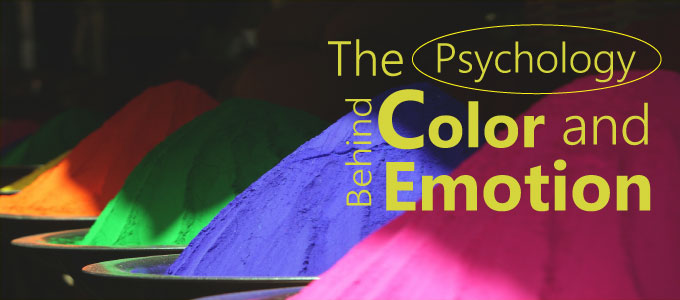There is a unique psychological understanding between colors and emotion. Look around you. What do you see? What colors are in your surroundings? How do they make you feel? If I told you that the room you are in influences how you are feeling, that statement probably wouldn’t surprise you. But what if I asked you to what degree do the colors of your environment influence your emotions? And how might colors influence a consumer’s reaction to your company collateral? That’s where things get interesting.
Traditional Stereotypes
Traditionally, colors are stereotyped in each culture. Yellow in America, for instance, is associated with happiness, joy and hope, while in Japan it means courage and aristocracy, and Greece, sadness.
In the Western culture, colors are stereotyped to children at a young age, even from birth. Boys are dressed in blue and girls are dressed in pink. More on this in the next section.
Below is an infographic of the meanings and emotions associated with colors, according to the Western culture. As you are reading, look at your surroundings. Are the stereotypes true for you?

Dependent upon Experience
Because each culture places emphasis on certain colors and emotion to others, it is important to acknowledge that color and emotion is dependent upon experience.
As previously mentioned, colors and meaning are stereotyped to children at a young age. Children are associated with specific colors based on gender/sex, religious discourse, family upbringing, and many other factors.
Boys are usually given red and blue toys as a child, and girls are given pink and purple toys. Children learn to associate their gender with these colors due to the inherent nature of understanding male and female.
“Once children recognize their own gender, they actively seek out gender-related information and integrate that information into their own developing concept of gender.” – Vanessa LoBue and Judy DeLoache
As children age they yearn to have positive experiences with the colors they are given, thus reinforcing gender and color stereotypes.
How Color Becomes (Emotional) Meaningful
With the positive experiences starts the process of semantic meaning creation. This is based on the associative network theory, or the idea that the brain is based on interconnected knowledge. Think of it this:
Emotion + Experience = Meaning
While the belief the black means death is true, it can also mean wealth and health to someone from the Eastern culture. That is because meaning depends on experience as stated above, but also culture and context as well.
That’s where it can get complicated… and psychology is very complicated. Let’s put it in simple terms with a story:
Think of a car. What comes to mind? You will have stronger connections, like tires, driving and roads, and weaker connections, such as radio, metal, and cupholders. But, if you have recently been in a car accident, you might think of pain. That is because your constantly improving your associative network and attributing new meanings to things.
Now what does that have to do with color?
Let’s say the color of the car that hit you in the car accident was red. Your brain will associate pain with the color red, as well.
How Do Color and Emotion Relate to Marketing?
People respond different to colors. Now that you know the traditional stereotypes of colors, how they are dependent upon experience, and how meaning is created you can use color choice in your marketing efforts to your advantage. Now that you understand how someone responds to a color, you can produce the desired response you wish.
While the interaction between meaning, colors and emotion cannot be universally accepted, it is important to acknowledge the influence color has on purchasing and branding. Stay tuned for more posts on color choice in marketing efforts!
If you have any questions about this post or need help with your business’s marketing efforts, call our office at 801-224-8666 or fill out the contact form below. Alexander’s Print Advantage has the creative team and printing equipment to give your business an edge.


